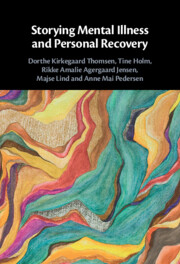Book contents
- Storying Mental Illness and Personal Recovery
- Storying Mental Illness and Personal Recovery
- Copyright page
- Contents
- Figures
- Tables
- Acknowledgments
- Chapter 1 Introducing the Book
- Chapter 2 The Science of Mental Illness
- Chapter 3 Vulnerability, Stress, and Burden in Mental Illness
- Chapter 4 Recovery and Mental Illness
- Chapter 5 Narrative Identity
- Chapter 6 Narrative Identity, Illness, and Well-Being
- Chapter 7 How Did We Collect and Analyze the Life Stories?
- Chapter 8 Overview of Narrative Identity Themes from the Initial Analyses
- Chapter 9 Relationship Themes in Narrative Identity
- Chapter 10 Self Themes in Narrative Identity
- Chapter 11 Functional-Level Themes in Narrative Identity
- Chapter 12 Treatment Themes in Narrative Identity
- Chapter 13 Summary and Synthesis
- Chapter 14 Understanding the Interplay between Narrative Identity and Mental Illness: A Framework
- Chapter 15 Tools for Narrative Repair
- Conclusion
- Book part
- References
- Index
Chapter 9 - Relationship Themes in Narrative Identity
Published online by Cambridge University Press: 02 February 2023
- Storying Mental Illness and Personal Recovery
- Storying Mental Illness and Personal Recovery
- Copyright page
- Contents
- Figures
- Tables
- Acknowledgments
- Chapter 1 Introducing the Book
- Chapter 2 The Science of Mental Illness
- Chapter 3 Vulnerability, Stress, and Burden in Mental Illness
- Chapter 4 Recovery and Mental Illness
- Chapter 5 Narrative Identity
- Chapter 6 Narrative Identity, Illness, and Well-Being
- Chapter 7 How Did We Collect and Analyze the Life Stories?
- Chapter 8 Overview of Narrative Identity Themes from the Initial Analyses
- Chapter 9 Relationship Themes in Narrative Identity
- Chapter 10 Self Themes in Narrative Identity
- Chapter 11 Functional-Level Themes in Narrative Identity
- Chapter 12 Treatment Themes in Narrative Identity
- Chapter 13 Summary and Synthesis
- Chapter 14 Understanding the Interplay between Narrative Identity and Mental Illness: A Framework
- Chapter 15 Tools for Narrative Repair
- Conclusion
- Book part
- References
- Index
Summary
In Chapter 9, we unfold subthemes within the superordinate theme of relationships. When our participants constructed their narrative identities, they emphasized how mental illness had strained and ruptured relationships, that others did not understand or stigmatized them, and how they withdrew and felt lonely. These subthemes carry toxic identity conclusions, including “I am a burden” and “I am alone” and capture narrative identity processes involved in social alienation and self-stigmatization. Although rarer, storylines of positive impact included empathy with others in difficult circumstances and growth of relationships with adaptive identity conclusions including “I can help others in pain,” which may propel individuals to engage in peer support, one aspect of personal recovery. When our participants narrated well-being into their identities, they expanded on subthemes where other people were depicted as supportive, understanding, and helping. They shared stories about acceptance, feeling valued, togetherness, safety and stability, the possibility of giving to others, and love. These subthemes can give rise to positive identity conclusions, encompassing “I can love, and others can love me” and “I can help and support others,” narrative underpinnings of connectedness and positive identity, which are central to personal recovery.
Keywords
- Type
- Chapter
- Information
- Storying Mental Illness and Personal Recovery , pp. 114 - 132Publisher: Cambridge University PressPrint publication year: 2023

